Every year, The Princeton Review ranks the top colleges and universities in the U.S. (with one exception from Canada) in a variety of categories including academics, extracurriculars, demographics and more.
The Princeton Review Press Office shared all of Lehigh’s rankings with The Brown and White since the list’s first publication in 1992.
There are 62 ranking lists based on student feedback about their own colleges through an 80-question student survey. Each list contains 20 schools.
Lehigh has made a substantial number of appearances in The Princeton Review’s lists over the years. In the 2021 book, Lehigh ranked on lists for: “Best Science Lab Facilities,” “Little Race/Class Interaction,” “Lots of Greek Life,” “Most Beautiful Campus,” “Students Study the Most,” “Their Students Love These Colleges” and “Town-Gown Relations Are Strained.”
The schools featured in “The Best 387 Colleges“ include only what The Princeton Review found to be the top 13 percent of all four-year colleges in the nation. The company collects data on more than 2,000 colleges and universities to create its annual book.
The survey students take to collect the data has more than 80 questions asking students about themselves, their school’s academics/administration, campus life and more, The Princeton Review said on its FAQ page. Colleges are given scores based on students’ answers in these questions.
The survey includes open-ended comment areas for students to give input in their own words about their colleges and universities. From those, The Princeton Review creates narrative profiles.
Students can submit a survey once per academic year, the FAQ page said.
Surveys of more than 143,000 students were collected to generate the ranking lists in the 2021 book of the Best 386 Colleges, the FAQ page said. The 2022 book of the Best 387 Colleges did not include ranking lists because of the impact of COVID-19 on school life. Many of the categories require on-campus experience.
“Due to the pandemic, students not being on campus, they weren’t able to give us the feedback that they usually do based on their campus experience,” Director of content development at The Princeton Review and a co-author of “The Best 387 Colleges,” David Soto said.
Lehigh has made multiple appearances on the “Party School” as well as “Lots of Greek Life” lists.
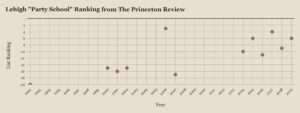
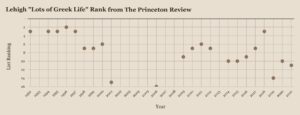
In the fall of 2020, 21.6 percent of undergraduates were involved in Greek life. In the spring of 2021 after formal rush took place, 31.1 percent of undergraduates were involved in Greek life.
“I think that there is certainly a perception that more students are involved in Greek life,” said Chloe Soloman, assistant dean/director of Fraternity and Sorority Affairs.
She said regardless of whether it is factual or perceived, perception is important.
Soto said the party school list has led to change on some campuses to crack down on partying.
In the spring of 2020, Greek life at Lehigh was paused in response to disciplinary action.
“Our job is just to relay this information to students and parents,” Soto said. “All the schools in the book are excellent academically, but we think we want to give students and parents the most information possible, and if an active social life on campus is part of that, we want to relay that.”
Soloman said Greek life has a historic presence on Lehigh’s campus. In February, the campus will be celebrating 150 years of Greek life at Lehigh.
She said Lehigh has a lot of institutional support for Greek life. There is an office with a dedicated staff — the Office of Fraternity and Sorority Affairs — which is sometimes asked to participate in admissions events, hosts 5 x 10s for first-years and presents at parent and family orientation.
Soloman said the office pays attention and is aware of when Lehigh Greek life is mentioned in the media. She gets Google alerts when it is mentioned in articles online.
“I do think that there’s a lot of emphasis and attention that gets written about in the fraternity and sorority industry related to the party scene and the party culture that has existed for decades,” Soloman said. “We don’t hear a lot about the positive things that fraternity and sorority communities offer.”
She said when the party scene and alcohol culture are highlighted, those become all Greek life is associated with, rather than the other aspects of it.
“Fraternities and sororities are social, they’re meant to be social environments, but they’re also meant to be spaces where students find their sense of belonging and community on campuses across America, as well as contribute to the greater good through community service and philanthropic initiatives,” Soloman said.
Lehigh has a history of placing on the “Little Class/Race Interaction” list and has been placed on the “LGBTQ-Unfriendly” list.
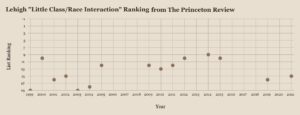
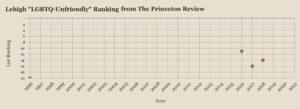
Donald Outing, vice president for equity and community, declined to comment on The Princeton Review rankings.
Soto said there are both positive and negative lists. So, while Lehigh placed on the list for “Little Race/Class Interaction,” there is also a list for “Great Race/Class Interaction,” and other lists have similar arrangements.
Former Director of Lehigh’s Pride Center, Chelsea (Fullerton) Gilbert, wrote an article in 2017 for Campus Pride addressing the rankings, calling The Princeton Review “a deeply flawed ranking.”
Soto said schools have the opportunity to resurvey if administrators do not agree with the sentiment of what they find.
He said schools are generally very helpful in facilitating the surveys, since surveying is a requirement for schools to be featured in The Prinection Review. Soto said The Princeton Review conducts the surveys with the help of administrators on campus, who usually send out an invitation to the student body with the survey link.
The Princeton Review formally re-surveys each school in the book at a minimum of once every three years. There are also surveys it receives from students outside of the typical cycle which are factored in.
Another one of the categories Lehigh is seen in is “Town-Gown Relations are Strained.”
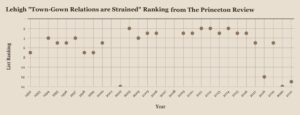
Carolina Hernandez, assistant dean and director of the Community Service Office, who does work with the local community, said she finds the ranking disappointing and frustrating.
“I think perception and reality don’t always match up when it comes down to this list,” she said.
Hernandez said the list is almost like a self-fulfilling prophecy in that once you’re on it, it changes the way you are perceived.
She said she feels there is a lot of good the university does with the community that is overlooked. She said that while in the 50s and 60s Lehigh’s relationship with local South Bethlehem may have been strained or challenging, there has been progress since then.
“I’ve been proud of the work that our office has been able to do with the community,” Hernandez said. “I just feel as if there’s a major disconnect there so it is absolutely frustrating.”
She said she tries not to pay attention to The Princeton Review.
She said it is discouraging to see the list when she knows that herself and the office have been working intentionally to improve the city and university relationship.
Lehigh is involved in the community through mentoring, tutoring, the community school partnership, SouthSide ambassadors and more.
Hernandez said over 2,000 students connect with the CSO at least one time during the academic year. She said one of its goals is for students to be active and engaged citizens in the community.
Lehigh placed once on The Princeton Review list of schools for “Lots of Sex.” This category is no longer included in the current edition of The Princeton Review book, but the graphic accurately reflects the data received from The Princeton Review.

Soto said rankings are all categories The Princeton Review thinks students and parents would be interested in when choosing a school.
“We don’t rank colleges like U.S. News from one to 2,000. We don’t think that would be a worthy project on our part,” Soto said. “What we can do is drill down into what we think students and parents are interested in, including campus culture issues, and give a slice of life of what it’s like to be on any single campus.”

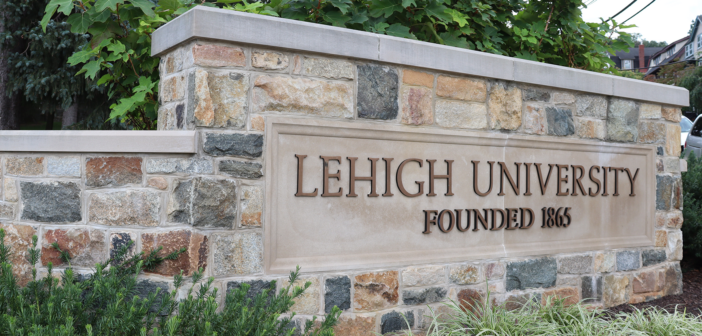

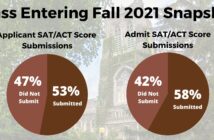
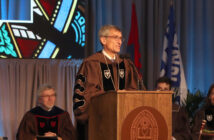
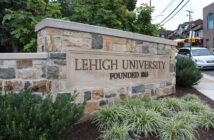
Comment policy
Comments posted to The Brown and White website are reviewed by a moderator before being approved. Incendiary speech or harassing language, including comments targeted at individuals, may be deemed unacceptable and not published. Spam and other soliciting will also be declined.
The Brown and White also reserves the right to not publish entirely anonymous comments.